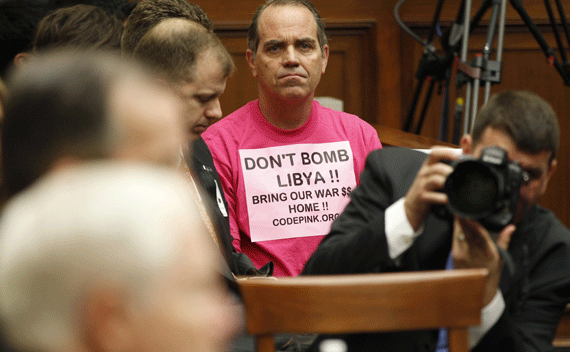Quick Takes: What Americans Think About Libya
More on:

Rasmussen Reports is out today with a new national survey on what Americans think about Libya. The answer is, not much. The poll found that just 26 percent of likely voters think that the United States should continue its military action in Libya. In contrast, 42 percent want the United States out.
The poll reveals some partisan differences. Fifty percent of respondents who identified themselves as Republicans say they want U.S. participation in Libya ended, and 46 percent of respondents who said they were not affiliated with either major party feel the same way. Rasmussen didn’t post the result for Democrats—you need to pay to find out that number—but it says that "Democrats are more narrowly divided, but 41% of those in the president’s party are undecided." So by inference, Democratic opposition to the Libyan intervention is presumably in the 25--35 percent range.
How worried should the White House be about these poll results? I’d say moderately. Presidents always want the American public squarely on their side and that’s not the case here. But the Rasmussen poll does contain some good news—a third of Americans remain on the fence about Libya. Moreover, while a plurality of Americans dislikes the Libyan intervention, the intensity of public opposition falls far short of the levels seen over Iraq in 2006 let alone Vietnam in the early 1970s. Voters aren’t marching on Washington demanding that Congress halt U.S. military action in Libya. True, the House did pass a resolution ten days ago scolding President Obama for failing to "provide Congress with a compelling rationale" for the Libyan intervention. But it was a non-binding resolution. Translation: Congress is not yet ready to confront the president directly. So a Qaddafi departure over the next couple of weeks could turn Operation Odyssey Dawn from a growing political problem into a political win for Obama.
For now, however, critics of the Libyan intervention will use the Rasmussen results to make the case that the American public is with them and not President Obama. Jon Huntsman has already jumped into the fray. His campaign has tweeted the poll results, and a group called Conservatives for Huntsman has posted a message calling their candidate "the most forceful voice among the top-tier Republican candidates for ending our, err, ‘Kinetic Military Action’ in Libya" and saying the poll is "striking evidence" that Huntsman is "right on this issue."
Huntsman won’t be able to press his case against Libya at tonight’s GOP presidential debate. He is sitting it out. But some of his rivals-to-be for the nomination share his skepticism. I will try to do a quick post later this afternoon sketching out the positions that the seven candidates in tonight’s debate have staked out on Libya and Afghanistan.
More on:
 Online Store
Online Store